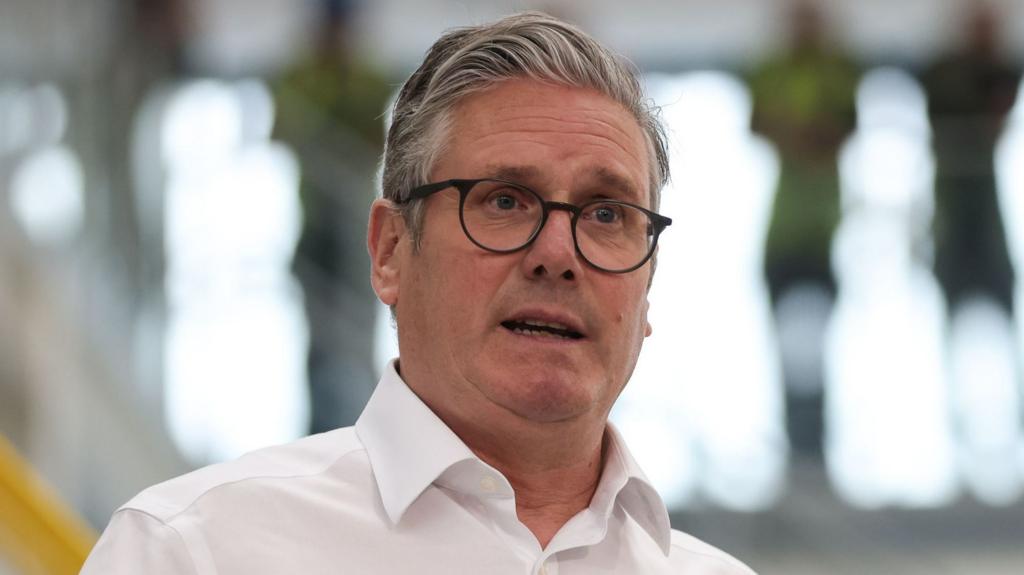Prime Minister Keir Starmer has issued a sharp rebuke of Reform UK’s economic policies, characterizing them as a recipe for economic disaster and drawing parallels between Nigel Farage and former Prime Minister Liz Truss.
In a speech directly targeting Farage, Starmer condemned Reform’s economic proposals as “fantasy economics,” criticizing their reliance on unfunded tax cuts.
Reform UK’s recent surge in the English local elections, solidifying its position as a significant challenger to the established parties, provided the backdrop for this critique.
A Reform UK spokesperson dismissed the Prime Minister’s comments as a desperate attempt to counter Labour’s lagging poll numbers.
Starmer’s speech, delivered at a research and development facility in northwest England, followed Farage’s announcement of several policy pledges earlier this week.
“We warned that Liz Truss’s policies would wreck the economy,” the PM stated, “and we were proven right. We were elected to clean up that mess. Now, we face the same reckless gamble from Farage.”
“Farage is Liz Truss 2.0,” he declared, accusing the Reform leader of repeating Truss’s mistake: “promising tens of billions in tax cuts without a credible plan to pay for them.”
Starmer accused Farage of jeopardizing families’ financial stability, characterizing the proposed policies as a reckless gamble with potentially disastrous consequences.
Truss’s 2022 mini-budget, featuring £45bn in unfunded tax cuts, triggered significant market instability and contributed to a rise in mortgage rates, serving as a cautionary tale.
The Prime Minister emphasized a personal contrast with Farage, countering Farage’s assertion that Reform represents working people.
“Unlike Nigel Farage, I understand the realities of a cost-of-living crisis,” he said, emphasizing his own experience with financial hardship and highlighting the considerable work ahead.
Starmer’s focused attack on Farage underscores the Prime Minister’s strategic shift, prioritizing Reform UK as a principal adversary despite the party’s relatively small parliamentary representation.
When asked about the emphasis on Reform UK, Starmer characterized the Conservative Party as politically exhausted and on the brink of collapse.
He further contrasted Labour’s commitment to fiscal responsibility with Reform UK’s “tens of billions” in unfunded spending, directly echoing the failures of the Truss administration.
In a recent speech, Farage outlined plans for increased tax breaks for married couples and the reinstatement of universal winter fuel payments for pensioners.
He also advocated for abolishing the two-child benefit cap, a policy that has drawn criticism from some Labour MPs.
Responding to a question on the two-child benefit cap, Sir Keir affirmed his commitment to tackling child poverty and indicated that various policy options were under consideration.
“There’s no single solution, but I am determined to reduce child poverty,” he stated.
Economists have questioned the funding mechanisms for Reform’s policies, particularly their proposal to raise the income tax threshold from £12,570 to £20,000.
The Institute for Fiscal Studies estimates the cost of this policy at £50bn-£80bn annually, highlighting the lack of detailed funding plans from Reform UK.
Reform UK has proposed offsetting these costs through cuts to net-zero initiatives, asylum seeker support, diversity and equality programs, and public sector quangos.
May’s local elections saw Reform UK make significant gains at the expense of both Labour and Conservatives, winning a by-election, two mayoral races and 677 council seats.
Reform UK chairman Zia Yusuf attributed their success to public perception of the party as a viable alternative and suggested that Starmer’s attack reflects his anxieties about Reform’s growing popularity.
Yusuf criticized the established parties’ claims of financial constraints, highlighting spending on issues like migration while asserting that pensioners are being overlooked.
Shadow Chancellor Mel Stride criticized both Labour and Reform UK for their handling of public finances, positioning the Conservatives as the party of fiscal responsibility.
Responding to Starmer’s criticism, Truss rejected his assessment, arguing that her policies were deliberately undermined.
Sign up for our Politics Essential newsletter for in-depth political analysis.
The defence review on Monday is expected to recommend the armed forces move to “warfighting readiness”.
Reform says a team lead by an as-yet unnamed tech entrepreneur will review council spending in Kent.
The vote will replace a councillor who stood down after failing to declare he was a council worker.
The party would be the UK’s first to accept the cryptocurrency as regulation discussion continues.
The Tory leader says the PM and Reform UK are in a “race to the bottom” to scrap the child benefit cap.

